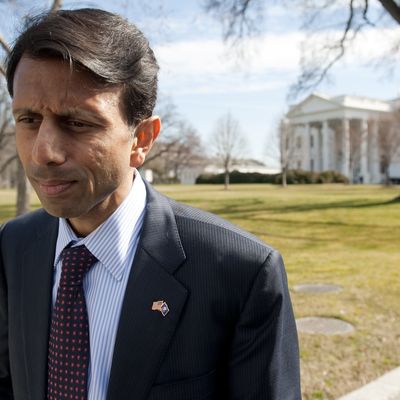
The political collapse of Bobby Jindal is one of the noteworthy developments of the year. Following the 2008 elections, when waves of young, minority, and college-educated voters swept Barack Obama into the presidency, Republicans cast their eyes around and noted their young, non-white, highly educated governor and dubbed him their next big thing. They tapped him to deliver the official response to Obama’s first State of the Union address, and his performance was deemed so abysmal, and comically reminiscent of the manner of 30 Rock character and notably non-presidential figure Kenneth the Page, that Jindal fell off the national map altogether.
After Obama won reelection — once again, Republicans noticed, with the same coalition of young, non-white, and college-educated voters — Republicans remembered they still had this Jindal guy sitting around. Jindal reinflated his reputation with speeches urging Republicans not to be the “stupid party,” advice that struck some of them as potentially a good idea. But now the second Jindal bubble has popped. His approval rating in his home state — a crucial measuring post for national viability — has dipped below 40 percent.
If the first Jindal collapse was farce, the second is tragedy. And the cause of it is easy enough to identify. Jindal unveiled a sweeping plan to eliminate the state’s income taxes and corporate taxes, replacing the lost revenue with cuts to social programs and higher sales taxes. It sent the hearts of national Republicans (like The Wall Street Journal editorial page and Grover Norquist) aflutter but provoked massive opposition within the state.
Benjy Sarlin concludes an excellent rundown of the debacle by suggesting “it may be time to rethink just how popular the whole ‘starve the beast’ approach actually is with voters.” That misses the crucial fact that caused the backlash against Jindal, and that also differentiates him from the national Republican approach.
Jindal’s plan exploded because it was zero sum. It cut taxes on the rich and raised them on the poor. It had to be zero sum because states have to balance their budgets.
But the federal budget doesn’t have to balance, and this fact underpins the entire Republican policy strategy over the last three decades. Before Ronald Reagan, Republicans cared a great deal about controlling the budget deficit and very little about cutting taxes for the rich. In an environment where every dollar into one account had to come from another, giving a lot of the dollars to a tiny number of people is almost invariably unpopular.
That’s why the GOP’s makeover into a more plutocratic party occurred simultaneously with its abandonment of old-fashioned fiscal conservatism. Lower taxes for the rich can work politically only if you obscure the fact that eventually the money has to come from somewhere else.
The Paul Ryan budget is instructive. The original version of it from 2010 included a sweeping, Jindal-style overhaul. It slashed taxes for the rich to such levels as to require, for the sake of avoiding an explosion of debt, middle- and lower-income Americans to pay around 50 percent more in taxes. When Republicans decided the next year to make Ryan’s budget the governing vision of their party, they scrapped the provisions to raise taxes on the non-rich and instead replaced the lost revenue with hand-waving nonsense.
Jindal was attempting to enact a state-level version of the Ryan approach, but in a context that left him unable to use the Ryan-style obfuscations that are necessary to hide the fact that it’s a gigantic exercise in upward redistribution of wealth. He may urge Republicans to stop being the stupid party, but the biggest fool is Jindal himself.






























